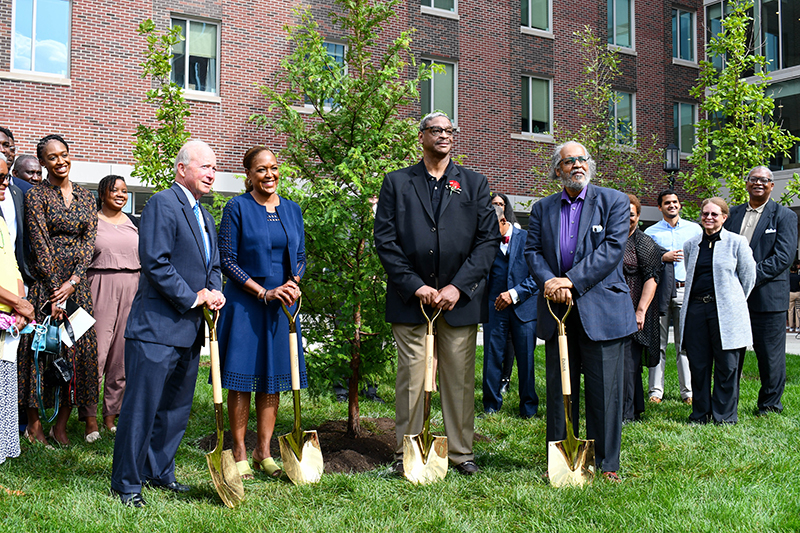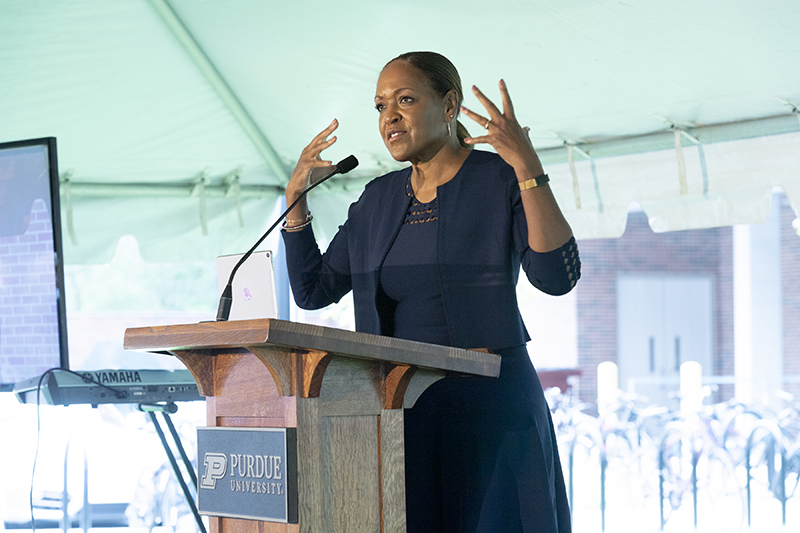
The renaming of the Griffin Residence Halls in honor of Frieda Parker (Jefferson) and Winifred Parker (White), sisters who led the campaign that compelled Purdue to integrate its student housing, was officially dedicated Sunday, October 3. The buildings, originally named after the mythical creature featured on the Purdue seal, are the first buildings on Purdue’s campus to be named after Black alumnae.
In June 2021, the Purdue Board of Trustees formally celebrated the legacy of the Parker sisters by voting unanimously to rename the residence halls in their honor. Provost Jay Akridge, along with Vice Provost for Diversity and Inclusion John Gates, brought forth the recommendation from Renee Thomas, former director of the Black Cultural Center. The buildings will serve as a monument to the courage, persistence and tenacity displayed by the Parker sisters during their time at Purdue and beyond.
Upon enrollment at Purdue in 1946, the Parker sisters were initially denied the opportunity to live in University housing. At the time, all housing at Purdue and in the city of West Lafayette was segregated, forcing the sisters to live in a boarding house in Lafayette. The sisters lived in a single room used as a passageway by others who lived in the house, with no shower or bath and just a single desk to share. Their commute to and from campus each day required two buses – hardly ideal conditions under which to pursue a degree. Due to these challenges, Winifred and Frieda missed out on many of the social and educational opportunities that resident students were able to enjoy.
Frederick Parker, a prominent math teacher at segregated Crispus Attucks High School in Indianapolis and father of the Parker sisters, mobilized support from connections in the Black community and started a letter-writing campaign to push the Purdue administration to reconsider its housing policies.
Among the recipients of Fred Parker’s letters was Indiana Gov. Ralph Gates.
“He made it well known that Purdue was a land-grant school supported by state taxes, and his taxes supported the school just like everyone else’s, so why couldn’t his children live on campus?” Frieda said of her father to University historian John Norberg. “The fact that Blacks were not allowed in the dorms was a policy that had been set up in the housing office at Purdue. It was not law.”
The governor took up the family’s cause, leading to Purdue admitting the Parker sisters into Bunker Hill in January 1947. They were among the first Black residents of Purdue. The location of the Parker halls is noteworthy in that they are just down the block from the former site of Bunker Hill.
The transition to living in University housing wasn’t always easy, and the sisters leaned heavily on the local Black community for support – particularly the friends they met through the Greek system as sisters in Delta Sigma Theta sorority. Over time, the sisters made friends in the residence hall and broke down some of the existing barriers. Their fellow residents eventually elected Winifred as secretary of the governing board for the Women’s Residence Halls.
After graduating from Purdue in 1950, each Parker sister went on to enjoy successful careers. A microbiologist by Purdue training, Winifred returned to college in the 1970s and completed a degree in guidance and counseling at the University of Wisconsin-Milwaukee. She spent the remainder of her professional life as a career counselor and advocate for the physically challenged and other underrepresented groups. Frieda worked for more than 50 years in education, including in Milwaukee Public Schools, where she was one of the founding organizers of the teacher’s union and president of the PTA. Winifred died in 2003, seven years after being diagnosed with Alzheimer’s disease, and Frieda passed away in 2020.
Purdue University has produced the following video documentary to highlight the story of the Parker sisters.
Adrienne White-Faines, the daughter of Winifred and niece to Frieda, was one of many family members present for the dedication of the Parker halls. She said that each of the sisters' families continued to instill the importance of education in their children. Frieda and her husband, Ralph, sent both of their sons to Purdue, while Winifred and her husband Walter’s four children – Winifred, Walter, Charles and Adrienne – also graduated college. All six of the sisters’ children went on to complete graduate programs.
“It’s understood that likely the strongest, most efficient and effective pathway to a more just and peaceful world is through education,” White-Faines said. “Therefore, because education comes in many forms, both in and out of the classroom, my mother and aunt were under no delusion that this would be easy – but they were prepared as Black women for the challenge. They believed and had a fundamental constitution to remain full of possibility, with a sense of hope for the future and an incredible sense of humor, which they kept lifelong, and a belief in their hearts that everyone can make a difference.”

